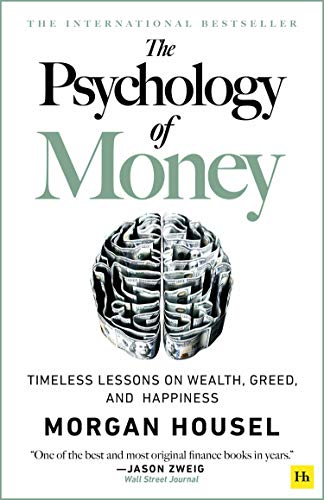 The Psychology of Money by Morgan Housel
The Psychology of Money by Morgan Housel
This book is a #1 bestseller on Amazon in its category and currently has 15,064 ratings that are 77% five star reviews. This book discusses behavioral economics in both personal finances and investing and gives solutions to the problems most people experience with money in their lives. This book is very different from other books as it approaches psychology more than the math or budgeting that most personal finance books discuss as their primary focus.
Most personal finance problems are not mathematical they have more to do with self control. Most investing problems arise from having strong opinions and believing in the ability to predict the future. The author shows paths that can lead to success in your financial journey.
Best Quotes from The Psychology of Money
“Spending money to show people how much money you have is the fastest way to have less money.”
“Someone driving a $100,000 car might be wealthy. But the only data point you have about their wealth is that they have $100,000 less than they did before they bought the car (or $100,000 more in debt). That’s all you know about them.
We tend to judge wealth by what we see, because that’s the (self-edit: only) information we have in front of us.”
“Be nicer and less flashy. No one is impressed with your possessions as much as you are. You might think you want a fancy car or a nice watch. But what you probably want is respect and admiration. And you’re more likely to gain those things through kindness and humility than horsepower and chrome.”
“Less ego, more wealth. Saving money is the gap between your ego and your income, and wealth is what you don’t see. So wealth is created by suppressing what you could buy today in order to have more stuff or more options in the future. No matter how much you earn, you will never build wealth unless you can put a lid on how much fun you can have with your money right now, today.”
“Planning is important, but the most important part of every plan is to plan on the plan not going according to plan.”
“Growth is driven by compounding, which always takes time. Destruction is driven by single points of failure, which can happen in seconds, and loss of confidence, which can happen in an instant.”
“Compounding works best when you can give a plan years or decades to grow. This is true for not only savings but careers and relationships. Endurance is key. And when you consider our tendency to change who we are over time, balance at every point in your life becomes a strategy to avoid future regret and encourage endurance.”
“Money’s greatest intrinsic value—and this can’t be overstated—is its ability to give you control over your time. Use money to gain control over your time, because not having control of your time is such a powerful and universal drag on happiness. The ability to do what you want, when you want, with who you want, for as long as you want to, pays the highest dividend that exists in finance.”
“Independence, to me, doesn’t mean you’ll stop working. It means you only do the work you like with people you like at the times you want for as long as you want.”
“Risk is what’s left over when you think you’ve thought of everything.”
“Some people are born into families that encourage education; others are against it. Some are born into flourishing economies encouraging of entrepreneurship; others are born into war and destitution. I want you to be successful, and I want you to earn it. But realize that not all success is due to hard work, and not all poverty is due to laziness. Keep this in mind when judging people, including yourself.”
The Psychology of Money summary
This is an enjoyable read for the philosophy, stories, principles, and common sense approach to the complex world of money and finance. This book could change the way young people think about money and is also a great refresher for those who need to be reminded of the principles that are most important. It does a great job of distilling the principles of financial peace, investing, and shows the path to eventual financial freedom. Most importantly is the principles he shares to use money as a tool to create happiness in your life. The Psychology of Money is likely to be the most enjoyable read you will ever experience with a personal finance book as Morgan Housel is one of the best finance writers today.
